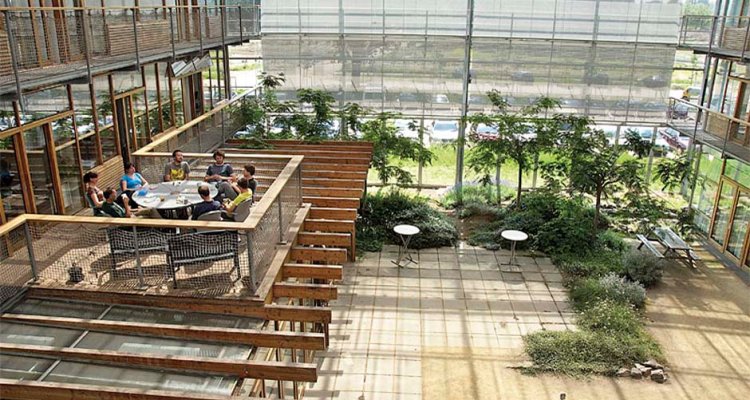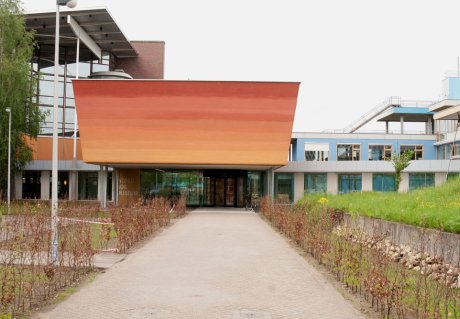
About Wageningen Environmental Research
Clearly, challenges such as food supply, climate change and the sustainability of our economy are increasingly demanding attention. These challenges are about the quality of life on Earth in general. The solution to many problems is anchored in the domain of the research of Wageningen Environmental Research, the leading research institute for our green living environment.
Wageningen Environmental Research offers a combination of practical, innovative and interdisciplinary scientific research across many disciplines related to the green world around us and the sustainable use of our living environment. Aspects of our environment on which Wageningen Environmental Research focuses include soil, water, the atmosphere, the landscape and biodiversity ‒ on a global scale as well as regionally, from the Dutch polders to the Himalayas and from Amsterdam to the Arctic.
Programmes
Network
Many environmental and spatial issues require a broad, often international approach. In order to have a social impact with our nature-based solutions, Wageningen Environmental Research collaborates with research institutions, governments, civil society organizations and the business community at home and abroad.
Read more
Some of the collaborations of Wageningen Environmental Research are:
- AMS Institute. AMS Institute is a young ambitious scientific institute in Amsterdam. In this institute science, education, government, business partners and societal organizations are working tightly together to create solutions for the complex challenges a metropolitan region like Amsterdam is facing. AMS Institute is active in the fields of research, education and data.
- Partnership for European Environmental Research Initiative (PEER). PEER is a partnership of eight of the largest European environmental centres carrying out research covering all fields of the environment, particularly addressing the interaction between man and nature.
- Green Circles. The initiative Groene Cirkels, formed by multinational HEINEKEN, the Provincial Government of South Holland, and knowledge partners Wageningen Environmental Research and Naturalis Biodiversity Center strives for a climate-neutral HEINEKEN brewery, a sustainable economy, and a pleasant living environment in the region of Zoeterwoude in the Netherlands.
- Climate-KIC. EIT Climate-KIC is a European knowledge and innovation community, working towards a prosperous, inclusive, climate-resilient society founded on a circular, zero-carbon economy.
- Nationaal Kennis en Innovatieprogramma Water en Klimaat (NKWK). The NKWK is a national programme within which government authorities, knowledge institutes and companies, work in conjunction on pilot projects, topical issues and long-term developments regarding a climate-resilient and water-robust Dutch Delta.
- The Water Supply and Sanitation Technology Platform (WssTP). WssTP was initiated by the European Commission in 2004 for Research and Technology Development in the water industry.
- European Topic Centres: Biological Diversity; Urban, Land and Soil Systems (ULS); Climate Change impacts, vulnerability and Adaptation (CCA).
- Ecoshape. EcoShape develops and shares knowledge about Building with Nature: a new approach to hydraulic engineering that harnesses the forces of nature to benefit environment, economy and society.
- CGIAR Research Program on Climate Change, Agriculture and Food Security (CCAFS). The CGIAR Research Program on Climate Change, Agriculture and Food Security (CCAFS) seeks to address the increasing challenge of global warming and declining food security on agricultural practices, policies and measures through strategic, broad-based global partnerships.
- ECMWF/ Copernicus Climate Change Service. ECMWF, the European Centre for Medium-Range Weather Forecasts, is implementing the Copernicus Climate Change Service (C3S). C3S is currently being developed through a number of climate change research initiatives and will provide comprehensive climate information covering a wide range of components of the Earth-system and timescales.
- Netherlands Ecological Research Network (NERN). NERN is supported and driven by a collaboration of graduate schools, research institutes, and universities that are significantly involved in fundamental research on ecology, evolution, and biodiversity.
- NERN/ Deltaplan Biodiversiteitsherstel. The Delta Plan for Biodiversity Restoration is a broad social movement for nature restoration in the Netherlands.
- World Overview of Conservation Approaches and Technologies (WOCAT). A global network on Sustainable Land Management (SLM) that promotes the documentation, sharing and use of knowledge to support adaptation, innovation and decision-making in SLM.
Corporate social responsibility
The management of Wageningen Environmental Reseach and the Department of Environmental Sciences, part of Wageningen University & Research, takes its social responsibilities by implementing a policy focused on a balance between economic, ecological and social interests.
Read more
The organisation contributes to a high-quality and sustainable green living environment through carrying out fundamental and applied research and providing academic education. The quality of our research and education activities is our main priority, with consideration for the interests of people and the environment in their mutual relationships. Employees, students, clients and other interested parties can rest assured that aspects such as safety, health, welfare and the environment will be taken into account when policy choices are made. Communication, openness and fulfilling agreements are core concepts within the chosen approach.
CSR according to the guideline ISO 26000
By applying the international guideline on Social Responsibility, NEN-EN-ISO 26000 (in which the methodology of NPR 9026+C1:2012 is applied), the organisation wants to deal with its social responsibility (CSR) in a proper and verifiable way. The principles and themes described in the guideline are important starting points for the decision-making process within the organisation. Priorities for the coming period are active involvement of stakeholders, the role of the organisation in society and CSR aspects in the preparation of international project proposals.
To demonstrate that we take our social responsibility seriously, the ISO 26000 self-declaration is reviewed and placed on the publishing platform of the NEN (in Dutch).
Quality improvement
Throughout the organisation, work is being done to improve quality. The objective is to successfully round off reviews as a test of scientific quality. Spearheads represent the motivation to ensure that clients are satisfied and that research is of high quality. Wageningen Environmental Research employs a quality management system in line with the ISO standard 9001:2015.
Environmental performance
Devoting attention to the green living environment occupies a central position within the organisation. The aim is to achieve continual improvement in our environmental performance. An active environmental policy forms an integral part of our operations and business strategy. The organisation complies with all applicable environmental legislation and regulations, as well as with the environmental policy of Wageningen University & Research and relevant covenants. WENR works with an environmental management system in accordance with the NEN-EN ISO standard 14001:2015.
Health and safety
The organisation offers a good quality and safe working environment and wants to prevent any harm to the health of employees and other concerned parties. The policy focuses on protecting personnel from pressure that could have a negative impact on their performance.
The points of departure for the sustainability policy of WENR and DES are included in the Sustainability Statement signed in October 2017.

